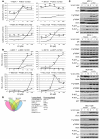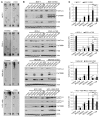Hyperactivation of phosphatidylinositol-3 kinase promotes escape from hormone dependence in estrogen receptor-positive human breast cancer
- PMID: 20530877
- PMCID: PMC2898598
- DOI: 10.1172/JCI41680
Hyperactivation of phosphatidylinositol-3 kinase promotes escape from hormone dependence in estrogen receptor-positive human breast cancer
Abstract
Many breast cancers exhibit a degree of dependence on estrogen for tumor growth. Although several therapies have been developed to treat individuals with estrogen-dependent breast cancers, some tumors show de novo or acquired resistance, rendering them particularly elusive to current therapeutic strategies. Understanding the mechanisms by which these cancers develop resistance would enable the development of new and effective therapeutics. In order to determine mechanisms of escape from hormone dependence in estrogen receptor-positive (ER-positive) breast cancer, we established 4 human breast cancer cell lines after long-term estrogen deprivation (LTED). LTED cells showed variable changes in ER levels and sensitivity to 17beta-estradiol. Proteomic profiling of LTED cells revealed increased phosphorylation of the mammalian target of rapamycin (mTOR) substrates p70S6 kinase and p85S6 kinase as well as the PI3K substrate AKT. Inhibition of PI3K and mTOR induced LTED cell apoptosis and prevented the emergence of hormone-independent cells. Using reverse-phase protein microarrays, we identified a breast tumor protein signature of PI3K pathway activation that predicted poor outcome after adjuvant endocrine therapy in patients. Our data suggest that upon adaptation to hormone deprivation, breast cancer cells rely heavily on PI3K signaling. Our findings also imply that acquired resistance to endocrine therapy in breast cancer may be abrogated by combination therapies targeting both ER and PI3K pathways.
Figures



Comment in
-
Breast cancer cells—escape artists.Nat Rev Clin Oncol. 2010 Sep;7(9):483. doi: 10.1038/nrclinonc.2010.127. Nat Rev Clin Oncol. 2010. PMID: 20824902 No abstract available.
References
-
- Arpino G, et al. HER-2 amplification, HER-1 expression, and tamoxifen response in estrogen receptor-positive metastatic breast cancer: a southwest oncology group study. Clin Cancer Res. 2004;10(17):5670–5676. - PubMed
Publication types
MeSH terms
Substances
Grants and funding
- R01 CA080195/CA/NCI NIH HHS/United States
- K23 CA121994/CA/NCI NIH HHS/United States
- P50 CA098258/CA/NCI NIH HHS/United States
- R21 CA120248/CA/NCI NIH HHS/United States
- R21CA120248/CA/NCI NIH HHS/United States
- F32 CA121900/CA/NCI NIH HHS/United States
- F32CA121900/CA/NCI NIH HHS/United States
- R01CA80195/CA/NCI NIH HHS/United States
- P50CA98131/CA/NCI NIH HHS/United States
- P30CA68485/CA/NCI NIH HHS/United States
- P50 CA098131/CA/NCI NIH HHS/United States
- K23CA121994/CA/NCI NIH HHS/United States
- P30 CA068485/CA/NCI NIH HHS/United States
- T32 CA009592/CA/NCI NIH HHS/United States
LinkOut - more resources
Full Text Sources
Other Literature Sources
Medical
Molecular Biology Databases
Miscellaneous

